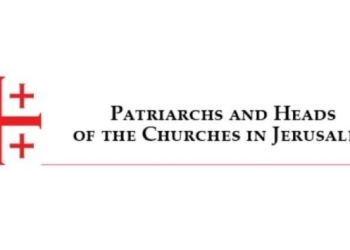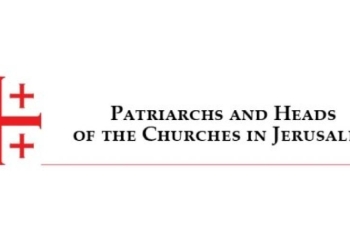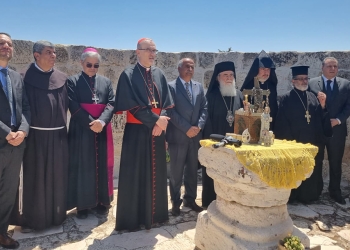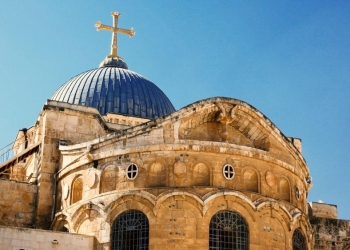We, the Council of the Patriarchs and Heads of the Churches in Jerusalem, have noted with grave concern the recent call of the new British Prime Minister, the Right Honourable Liz Truss, for her government to review the placement of the British Embassy to Israel. This directive was in response to the request of the Conservative Friends of Israel, who seek to have the Embassy moved from its present location in Tel Aviv to a new site in Jerusalem.
As a city holy to the three Abrahamic Faiths representing more than half the world’s population, Jerusalem has long been recognized by the International Community, including the United Kingdom, as having a special status (Corpus Separatum), one aimed at safeguarding the freedom of religion, the sacred character of Jerusalem as a Holy City, and the respect for, and freedom of access to, its holy places (UN Report, “The Status of Jerusalem,” 1997).
As Churches, our ecclesiastical jurisdictions cover all of the political territories of the Holy Land, a region where Christians have lived for 2,000 years, under many different empires and governments. The religious Status Quo in Jerusalem is essential for preserving the harmony of our Holy City and good relations between religious communities around the globe.
Implicit to the recognition of this Status Quo is the aforementioned Corpus Separatum that most of the world’s governments have applied by refraining from locating their embassies in Jerusalem until a final status agreement on the Holy City has been reached. The contemplated movement of the British Embassy to Jerusalem would severely undermine this key principle of Corpus Separatum and the political negotiations that it seeks to advance.
Indeed, the very act of reviewing the placement of the British Embassy not only suggests that negotiated agreements regarding Jerusalem and the West Bank have already resolved the ongoing disputes between the involved parties—when in fact they have not—but also implies that no such negotiations are needed: that the continuing military occupation of those territories and the unilateral annexation of East Jerusalem are both acceptable. We cannot believe that this is the message that the British government wishes to send to the world.
In view of these considerations, the Council of the Patriarchs and Heads of the Churches in Jerusalem regards this Embassy Review as a further impediment to advancing the already moribund Peace Process. Rather than commit valuable governmental resources to such a counterproductive endeavour, we encourage the British Prime Minister and government to instead redouble their diplomatic efforts towards facilitating the restart of negotiations between Israel and the Palestinian Authority in order to move forward with a time-delimited and phased Peace Initiative, all in accordance with International Law and relevant UN resolutions.
Only through such an Initiative, we believe, will a just and lasting peace ever be established in Jerusalem and throughout the Middle East.
- The Patriarchs and Heads of Churches of Jerusalem
________________________________________________________________________________
Cardinal Vincent Nichols, President of the Bishops’ Conference, has written to Prime Minister Liz Truss to express his “profound concern” after it was announced that the PM told her Israeli counterpart Yair Lapid that she is reviewing the location of the British Embassy in Israel.
The suggestion is that the review is focussing on whether to move the embassy from Tel Aviv, where almost all other countries have their embassies, to Jerusalem – a move that Cardinal Nichols says “would be seriously damaging to any possibility of lasting peace in the region and to the international reputation of the United Kingdom.”
The Cardinal also adds his voice to that of Pope Francis and Christian leaders in the Holy Land, saying: “Pope Francis and the leaders of churches in the Holy Land have long called for the international Status Quo on Jerusalem to be upheld, in accordance with the relevant resolutions of the United Nations. The city must be shared as a common patrimony, never becoming an exclusive monopoly of any party.”
Expressing his view that there is no valid reason to move the embassy, Cardinal Nichols writes: “I ask you earnestly to reconsider the intention you have expressed and to focus all efforts on seeking a two-state solution, in which Jerusalem would have a guaranteed special status.”




